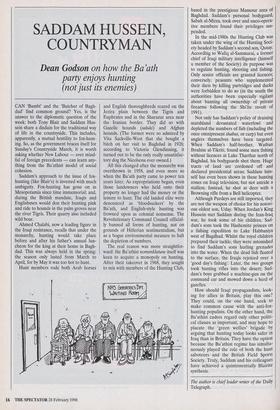SADDAM HUSSEIN, COUNTRYMAN
Dean Godson on how the Ba'ath
party enjoys hunting (not just its enemies)
CAN `Bambi' and the 'Butcher of Bagh- dad' find common ground? Yes, is the answer to the diplomatic question of the week: both Tony Blair and Saddam Hus- sein share a disdain for the traditional way of life in the countryside. This includes, apparently, a mutual hostility to fox-hunt- ing. So, as the government braces itself for Sunday's Countryside March, it is worth asking whether New Labour — ever mind- ful of foreign precedents — can learn any- thing from the Ba'athist model of social cohesion.
Saddam's approach to the issue of fox- hunting (like Blair's) is invested with much ambiguity. Fox-hunting has gone on in Mesopotamia since time immemorial; and, during the British mandate, Iraqis and Englishmen would don their hunting pink and ride to hounds in the palm groves near the river Tigris. Their quarry also included wild boar.
Ahmed Chalabi, now 'a leading figure in the Iraqi resistance, recalls that under the monarchy, hunting would take place before and after his father's annual lun- cheon for the king at their home in Bagh- dad. This was always held in the spring: the season only lasted from March to April, for by May it was too hot to hunt.
Hunt members rode both Arab horses and English thoroughbreds reared on the Jezira plain between the Tigris and Euphrates and in the Sharazur area near the Iranian border. They did so with Gazelle hounds (saluki) and Afghan hounds. (The former were so admired by Vita Sackville-West that she bought a bitch on her visit to Baghdad in 1926; according to Victoria Glendinning, it turned out to be the only really unsatisfac- tory dog the Nicolsons ever owned.) All this changed after the monarchy was overthrown in 1958, and even more so when the Ba'ath party came to power ten years later. As expropriations began, even those landowners who held onto their property no longer had the money or the leisure to hunt. The old landed elite were denounced as 'bloodsuckers' by the Ba'ath, and English-style hunting was frowned upon as colonial nonsense. The Revolutionary Command Council official- ly banned all forms of hunting, not on grounds of Hitlerian sentimentalism, but as a bogus environmental measure to halt the depletion of numbers.
The real reason was more straightfor- ward: the Ba'athist nornenklatura itself was keen to acquire a monopoly on hunting. After their takeover in 1968, they sought to mix with members of the Hunting Club, based in the prestigious Mansour area of Baghdad. Saddam's personal bodyguard, Sabah al-Mirza, took over and unco-opera- tive members found their privileges sus- pended.
In the mid-1980s the Hunting Club was taken under the wing of the Hunting Soci- ety headed by Saddam's second son, Qusay. According to Wafiq al-Sammarai, a former chief of Iraqi military intelligence (himself a member of the Society) its purpose was to regulate hunting, shooting and fishing. Only senior officials are granted licences; conversely, peasants who supplemented their diets by killing partridges and ducks were forbidden to do so (in the south the authorities have been especially vigilant about banning all ownership of private firearms following the Shi'ite revolt of 1991).
Not only has Saddam's policy of draining marshland devastated waterfowl and depleted the numbers of fish (including the once omnipresent shabut, or carp) but even anglers themselves have been targeted. When Saddam's half-brother, Watban Ibrahim al-Tikriti, found some men fishing without licences at Lake Tharthar north of Baghdad, his bodyguards shot them. Huge tracts of land are cordoned off and declared presidential areas; Saddam him- self has even been shown in these hunting zones on Iraqi television, but not astride a stallion. Instead, he shot at deer with a Browning rifle from a Bell helicopter.
Although Purdeys are still imported, they are not the weapon of choice for his notori- ous oldest son, Uday. When Jordan's King Hussein met Saddam during the Iran-Iraq war, he took some of his children. Sad- dam's sons took the Hashemite princes on a fishing expedition to Lake Habbaniya west of Bagdhad. Whilst the royal children prepared their tackle, they were astonished to find Saddam's sons hurling grenades into the water. When the dead fish floated to the surface, the Iraqis rejoiced over a `good day's fishing'. Later, the two groups took hunting rifles into the desert; Sad- dam's boys grabbed a machine-gun on the command car and mowed down a herd of gazelles.
How should Iraqi propagandists, look- ing for allies in Britain, play this one? They could, on the one hand, seek to make common cause with the anti-fox- hunting populists. On the other hand, the Ba'athist cadres regard only other politi- cal classes as important, and may hope to placate the 'green wellies' brigade by arguing that hunting today looks safer in Iraq than in Britain. They have the option because the Ba'athist regime has simulta- neously played the role of both the hunt saboteurs and the British Field Sports Society. Truly, Saddam and his colleagues have achieved a quintessentially Blairite synthesis.
The author is chief leader writer of the Daily Telegraph.


























































 Previous page
Previous page